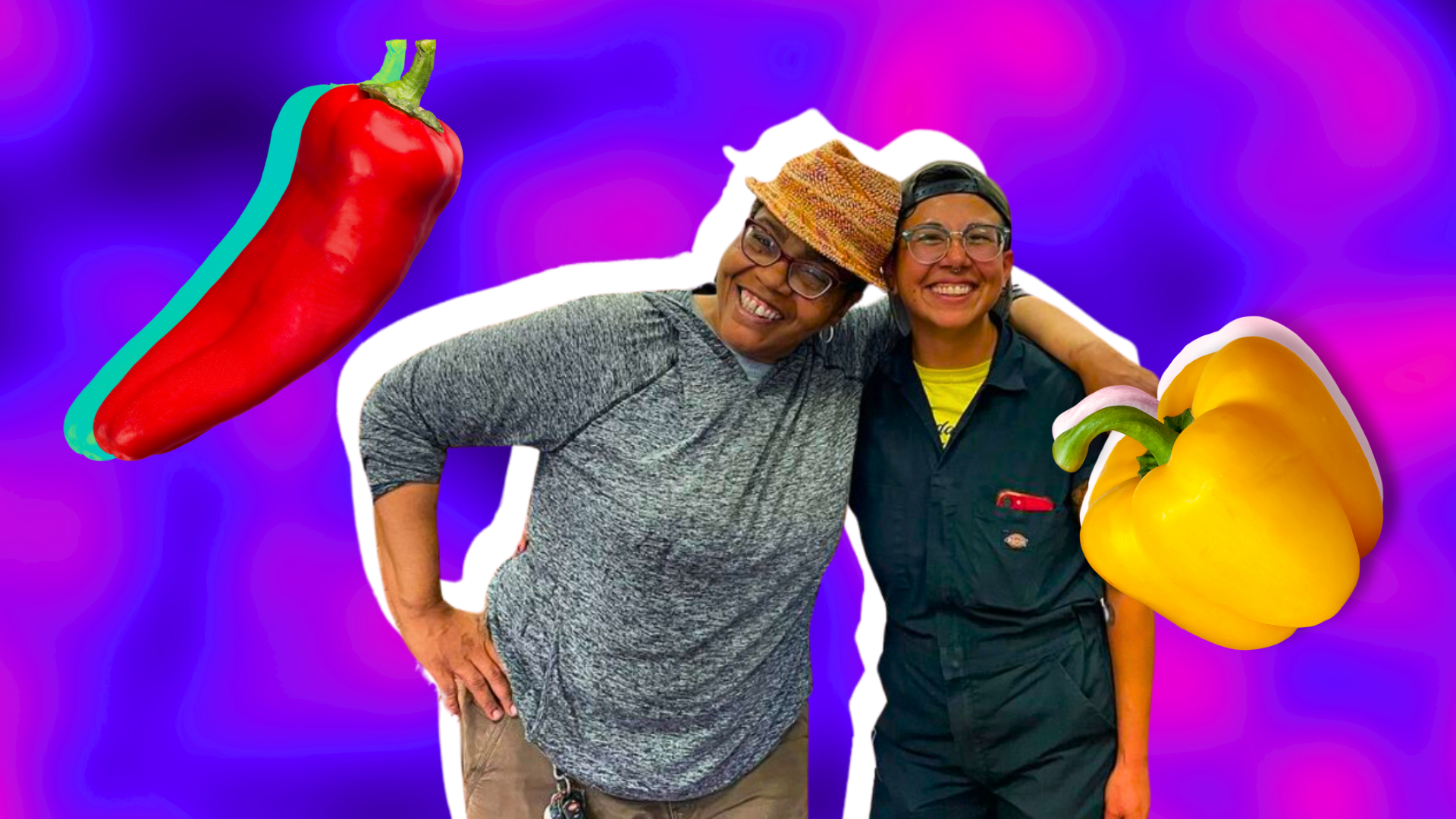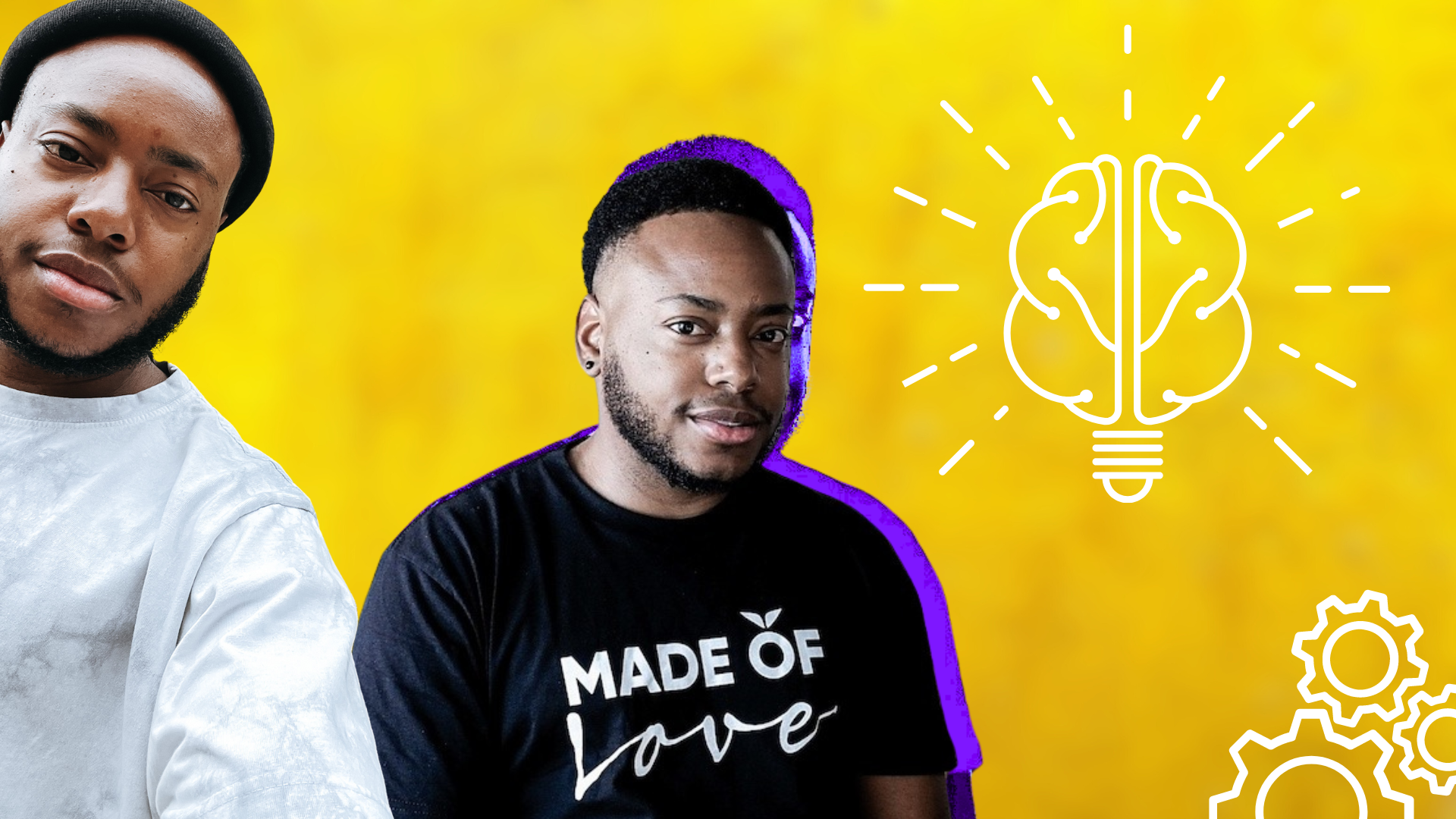
My Experience as a Queer Black Femme at Stagecoach 2024
- Queer Travel
-
May 12
- Share post
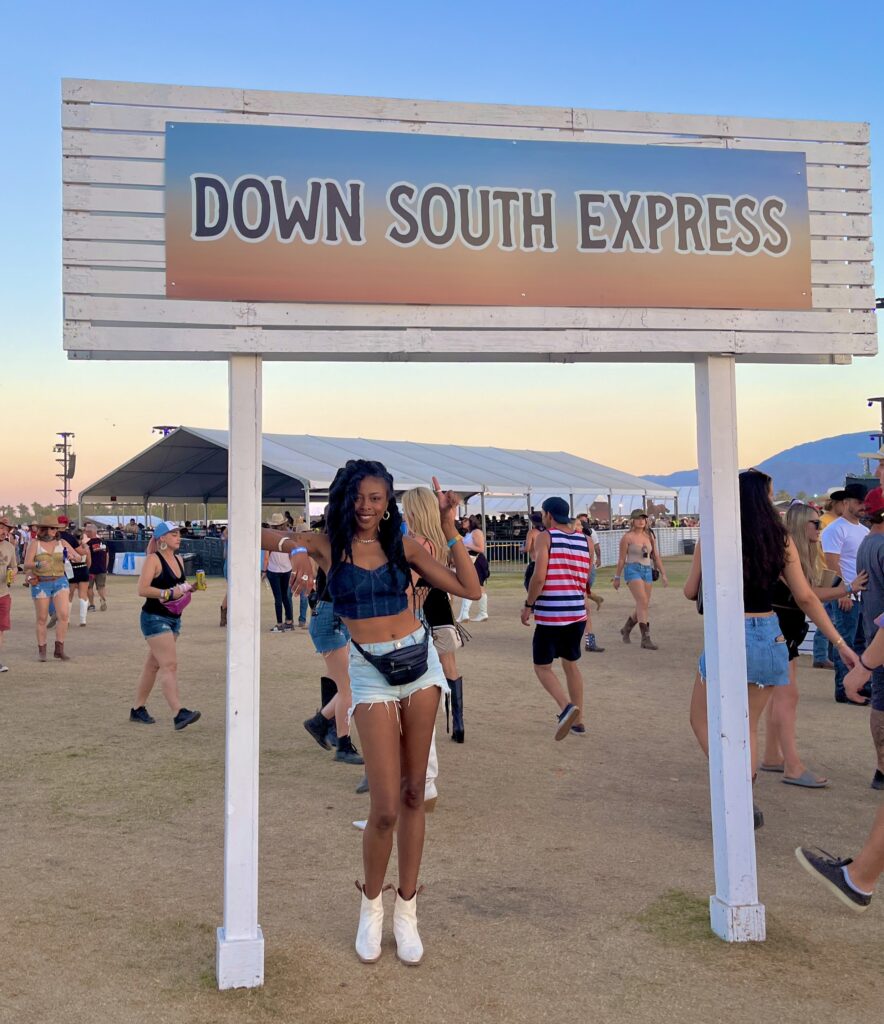
As a black woman who spent her 90’s childhood in the “melting pot of cultures” that is the San Francisco Bay Area suburbs, my musical tastes have always been very eclectic. I definitely saw my way through both the screamo scene culture of culture of the early 2000’s, (side-swept bangs covering an entire eye, black eyeliner, studded belts and skinny jeans before they were a thing) and the hot pink Juicy Couture / Baby Phat era that had a chokehold on so many of us. But there was one particular side of my interests that I kept much quieter as a young black teen – my love for country music.
The bright mandolins and steel guitars. The distinct regional twang. The southern drawl which elongated the pronunciation of even the shortest monosyllabic words. The story-driven lyrics. I loved it all, despite the fact that I was born in the Bay Area and had zero accent to speak of. My family on both my mom’s and dad’s side were from Alabama. Perhaps my love for the genre was somewhat “in my blood?”
The “why” of it all didn’t really bother me too much. The fact was, during my most country-obsessed era from 2003 – 2005, I knew every single word to every single song on the radio, and yet I never once saw any of my favorite artists perform live. Part of this was because literally none of my friends were as into the genre as I was. But really, it was also because I was… scared. I was used to being the only Black girl in the emo band or on varsity Volleyball team, but the idea of going to a country music show as a young Black teen felt very different.
Even at that age I did have a general awareness of the pro-white southern pride rhetoric that sat just a thinly veiled layer or two behind the whiskey-soaked lyrics that country music is known for. Even though I grew up in a very diverse community, the whole idea of almost being guaranteed to the only Black person in a majority white and often Republican space made me very uncomfortable in a new, more potentially dangerous kind of way that I wasn’t sure if I was ready for.
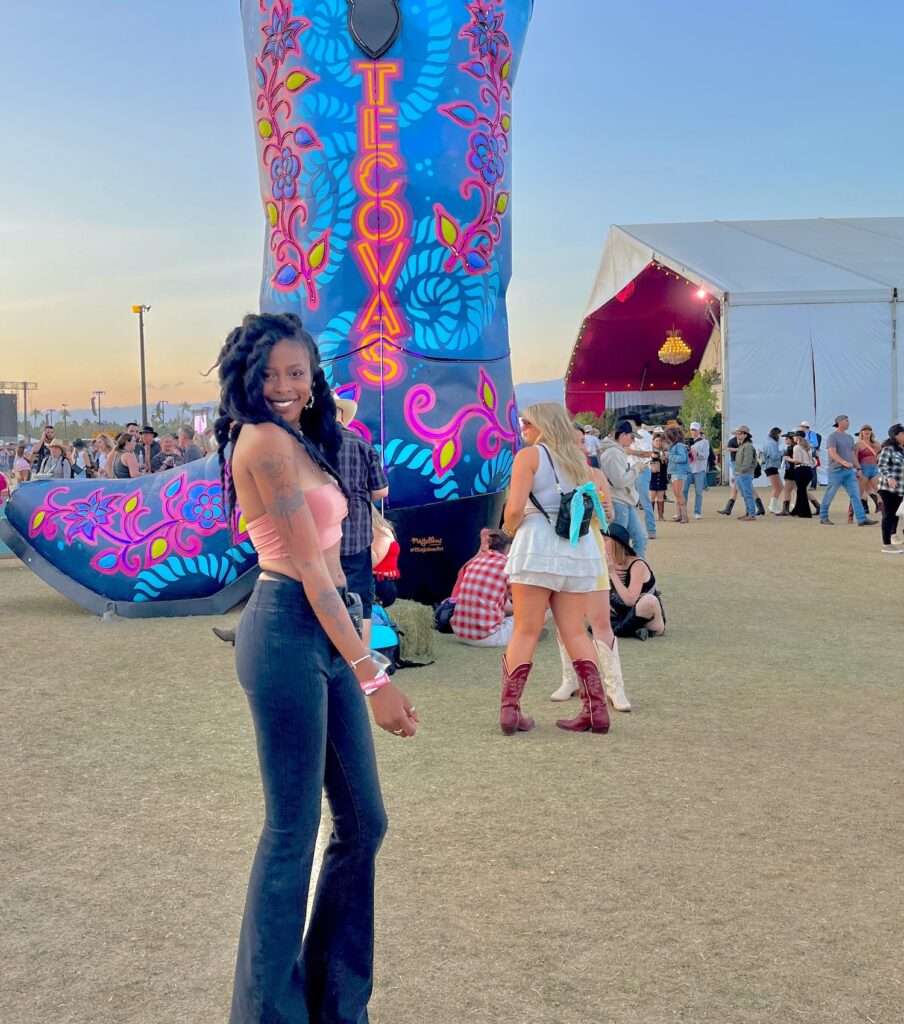
Fast forward to the year 2024. Here I am, mid 30s and still living in the SF Bay Area. One of my good friends (who is white) asks me if I like country music. I tell her that, believe it or not, I do. She enthusiastically extends the invitation to accompany her and another (white passing) friend to what is probably the largest country music festival in existence – Stagecoach.
Finally, 20 years later, my dreams of seeing country music sung live would become a reality. As far as I was concerned, the timing couldn’t have been better. I was in my 30s now, and far better suited to navigate any unsettling social situations that had the potential to pop up. Plus, the festival would take place just mere days after the release of Beyonce’s newest album, Cowboy Carter – a country album! Even cooler, there was plenty of excitement in the air about the entry of emerging Black country artists like Tanner Adell (who I am OBSESSED with, by the way) and Shaboozey into the country music Top 40. It appeared as though the genre had literally never been friendlier towards Black artists. But would that open mindedness extend to Black fans in country music spaces?
The only way to know was for me to F around and find out! Here’s what I learned.
Are there Black people at Stagecoach?
Let’s first note that I attended all three days of the festival and was there for the majority of the day each day. My friends and I definitely weren’t glued to lawn chairs. We strutted through the 88 degree desert weather in our western-inspired outfits, wanting to see and be seen, grabbing overpriced lemonades, fruit cups and Stagecoach merch, maneuvering to the front row of some sets and staying in the middle of the crowd for others. I can honestly say that over the course of the 3 days, not counting festival employees or performers, I probably could count on 1 hand the number of other black people I saw, most of which were women or outwardly femme presenting people. I could count on 2 hands the number of non-Black POC that I saw. There were 70,000 people in attendance, mind you. So in short – yes, but very, very few.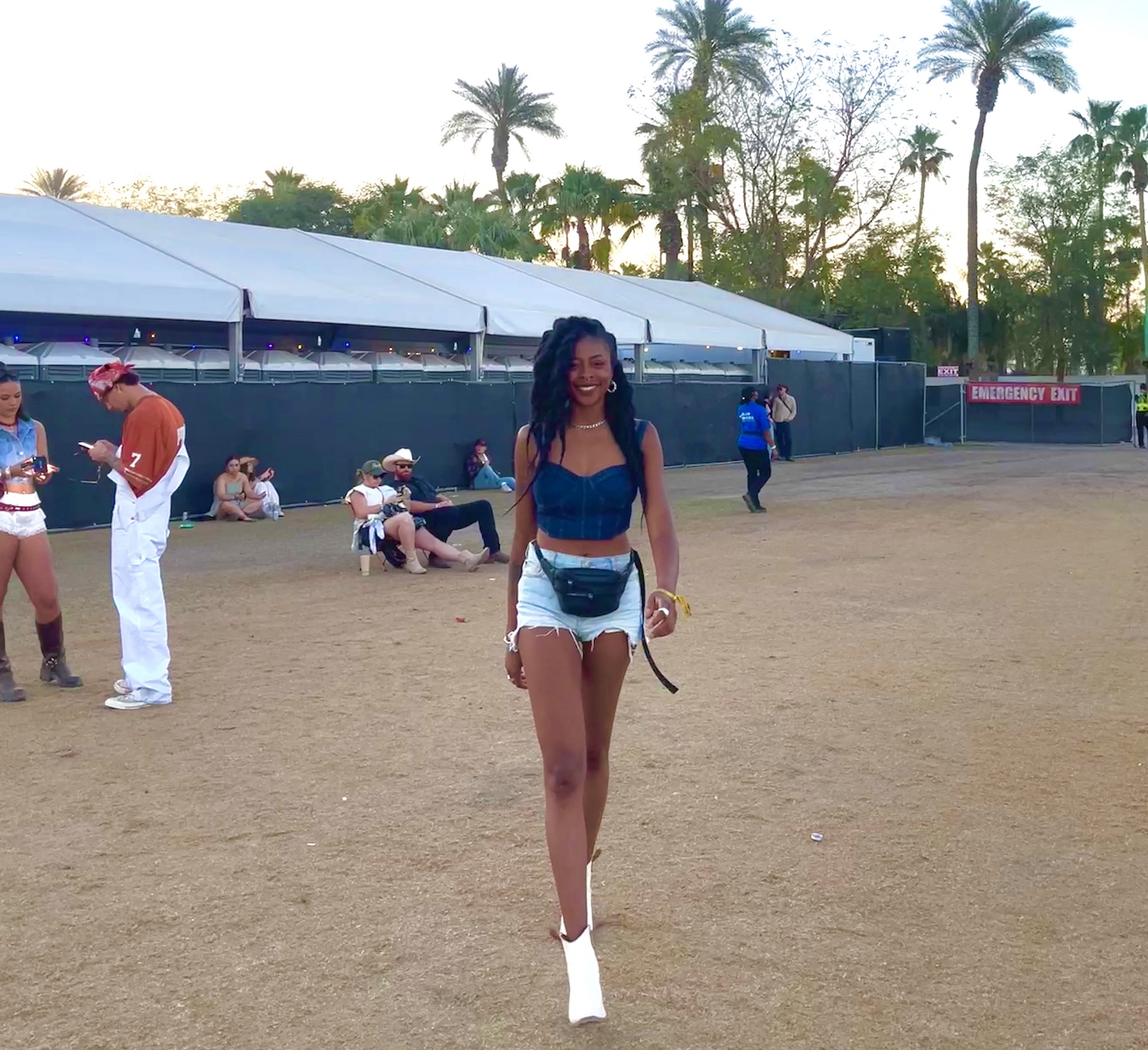
Did I feel welcomed as a Black woman at Stagecoach?
Sort of. Overall yes? I saw many more neutral faces than smiling ones (even a few faces with the mildest hint of surprise on them), but that wasn’t too different than what I’d experience in any other large mass of people where Black people aren’t the majority. There were even a few white women who went out of their way to give me a compliment on my outfit or hair (and no, no-one asked to touch it), so that felt nice.
While I wouldn’t say that I ever felt explicitly “welcomed,” at Stagecoach, I also don’t think it was anyone’s responsibility to go out their way to do so, nor did I personally need to see a bunch of outwardly “friendly faces” in order to have a good time. I think I experienced the normal base level of friendliness from everybody, and that was totally fine!
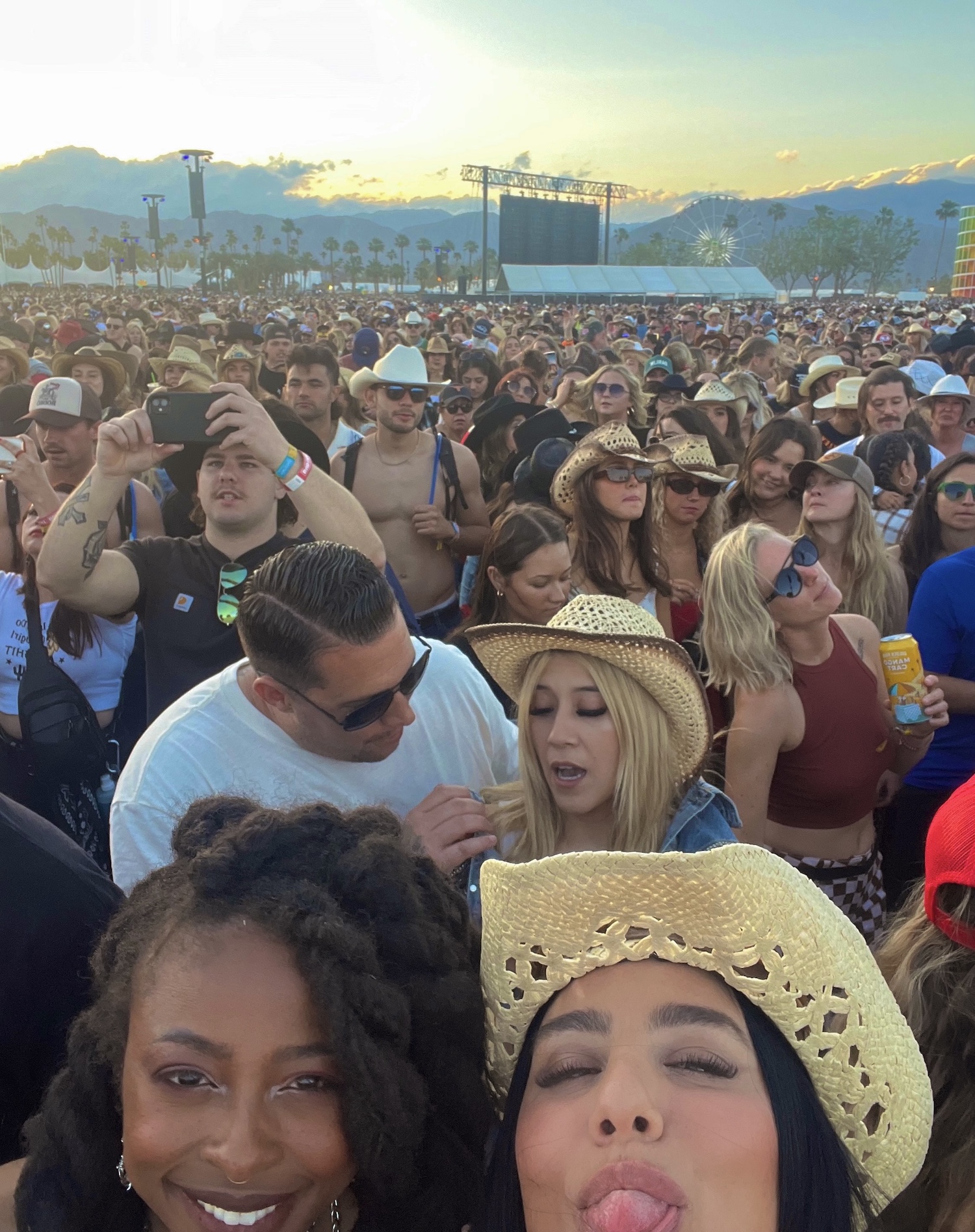
Did I see any other LGBTQ+ people at Stagecoach?
The answer to this one is somewhat surprising. But first, it’s important to note that both friends who accompanied me to Stagecoach identify as queer – although none of us are “visibly queer.” My cis-woman friend who accompanied me and identifies as a queer femme, but to all casual observers, looks like a straight woman. And my male friend is trans, but this again cannot be distinguished visibly. And me? Despite my septum ring (lol), I “look” fairly straight as well. So to nearly anyone watching us, our group simply looked like a black woman, a white woman and a white-passing dude. That being said, my friends and I actually made a little game of counting how many visibility LGBTQ+ people we saw at the festival. Over the course of the 3-day festival, we saw what looked liked 5+ lesbian couples stealing kisses or holding hands in a clearly romantic way, and one potential gay man couple. Other than that, we did not see any other visibly queer LGBTQ+ folks.
Did I feel safe attending Stagecoach?
Again – sort of. Overall yes? I think a lot of my general feeling of safety had to do with the fact that I was flanked by two white or white passing people – one woman and one man. Through my proximity to whiteness, I was probably extended more neutrality or friendliness than I would have had I been accompanied by a group of Black people or people of color. Remember that I saw less than 5 other Black people the entire 3-day festival.
Did anything racist happen at Stagecoach?
Not directly, no. For the vast majority of the festival, I felt safe weaving in and out of tightly packed crowds, waiting impatiently in winding bathroom and food lines, and posing for cute pictures in front of large swaths of white festival-goers. There was, however, one chunk of time that sticks out where I was borderline wondering if perhaps it was in fact time to leave for my own safety.
It was the final day of Stagecoach, just as afternoon was transitioning to night time festivities, and the singer Hardy was on the main stage. Now, I’m not a Hardy fan, nor am I familiar with his stage persona or politics, so perhaps this is par for the course when it comes to him – but there was one point about 5 songs into his set where things seemed to take a politically-charged right turn. Right after one of his harder Kid Rock-style songs, he started giving a speech about “America being the best country” and that “no one could tell him what to do.” A close up of the American flag waved threateningly across all of the giant telemonitors.
At this point in time, my friends and I were positioned at the far back of the crowd against a shaded makeshift wall, sitting on a blanket along with a large group of similarly run down festival-goers. As my friends and I sat silently surveying the rapidly changing situation, you could literally see the energy shift, from lazy, low key party vibes to a tense, pent up, prideful energy waiting to be released… or directed at someone. Affirming shouts of “yeah!” and “America!” erupted from around from every direction, and I found myself worriedly thinking that if the next words out of his mouth could be interpreted as even half-way anti-black or anti-immigrantion, it would definitely be time to pack up the blanket and say goodbye to Stagecoach.
Interestingly enough, Hardy’s set seemed to abruptly get cut off pretty soon after his speech. The riled up, buzzing crowd quickly settled back down as country’s most misunderstood Bad Boy Sweetheart, Morgan Wallen, who sings catchy songs about sobriety struggles and bittersweet heartbreak (love his song, The Way I Talk, a soaring ode to his very recognizable southern accent) took the stage. Phew.
Would I go to Stagecoach again?
Yes, definitely! Between the music that I am (reluctantly) a pretty big fan of and the overall scarcity of live country music shows, the cute western fashion that’s a natural fit for a long legged, boot-loving woman like myself, the surprisingly decent food and the high-desert festival location (I LOVE the sun), I can honestly say that I did have a really good time. But unfortunately, for people of color or outwardly “visible” members of the LGBTQ+ community, in order to balance one’s enjoyment of the genre with optimizing your actions for maximum safety, I would generally recommend thinking carefully about who you attend the festival with, and how bad you really want to see that favorite country song of yours performed live.
Perhaps in future years the country music genre as a whole will continue to diversify, and with that, spaces like Stagecoach will feel safer to more groups of people without needing to give even a second thought to things like “proximity to whiteness.” A girl can hope 🙂
You can follow the queer travel adventures of Montana H. on her Instagram.
Check out our queer events in cities like the SF Bay Area, NYC, Los Angeles and more.
